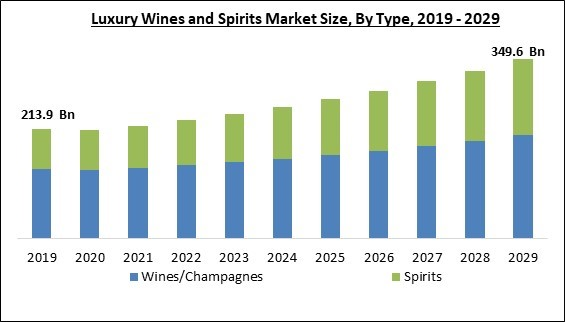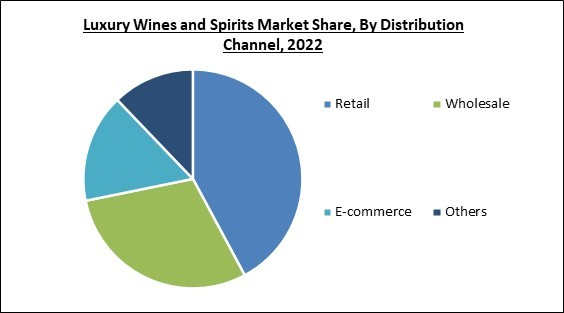Customers are more concerned with their environmental impact and seek goods produced using sustainable and environmentally friendly practices. As a result, there is an increase in demand for organic wines and spirits made from grapes grown without synthetic fertilizers and pesticides. The demand for wines and spirits made sustainably is also fueled by the need for authenticity and transparency. Because they want to know where and by whom their products are made, consumers are more likely to support businesses committed to sustainability and moral manufacturing practices.
As a result, there has been a growth in the production of biodynamic or sustainable wines and spirits, which are made using a comprehensive process that considers the health of the environment and vines. The demand for luxury wines and spirits is further fueled by increased consumer interest in these beverages. As consumers' interest in wine and spirits increases, they look for exceptional, stand-out products that offer a fresh and engaging experience. As a result, high-end wines and spirits that frequently have particular flavors, production processes, or histories are in high demand.
In addition, wine and spirit tourism is becoming increasingly popular due to customer curiosity about the production and history of their favorite beverages. This has increased the popularity of wine-tasting events and vineyard tours, which usually offer distinctive and pricey goods. Additionally, people can now readily buy high-end products online due to the internet, which has made acquiring information on wine and spirits easier than ever. This has increased the accessibility of premium wines and spirits to a larger variety of consumers, which boosts demand for these goods.
COVID-19 Impact Analysis
The COVID-19 outbreak, in particular the subsequent lockdown, has devastated the luxury wine and spirits market, resulting in the temporary closure of numerous manufacturing facilities and a decline in customer demand for luxurious beverages. Because the outbreak of SARS-CoV-2 has had such devastating effects on the luxury wine and spirits market, players are now more intent on fortifying their supply chains and speeding up their business operations to expand their product offerings and draw in more customers. In addition, consumer preference for luxury wines and spirits has risen, fueling market expansion, with the blockade lifted in all nations and the new coronavirus being under control.Market Growth Factors
Growing Acceptance of Alcoholic Drinks Among Societies
Over the past few decades, wine production, as well as consumption, have grown quickly, which has changed the way that people tend to consume it. Nowadays, modernization, social contacts, and the growing embrace of Western culture are some of the elements encouraging alcohol socializing among consumers. The market for low-alcohol beverages is expanding as alcohol intake is increasingly seen as a marker of social standing. Because of its refreshing attractiveness and low ABV offerings, it is becoming extremely popular among millennials and young people. The development and introduction of innovative items into the market are further encouraged by this rising demand, ensuring the market's continued expansion.Growing Interest in Fortified and Other Premium Ingredients
The consumption of this beverage is now more frequently associated with an affluent and lavish lifestyle, which promotes market growth for luxury wines and spirits. Customers in major industrialized countries are adventurous and eager to buy various high-quality products. Manufacturers strongly emphasize releasing several premium and sensory brands to the market as customers become "wine connoisseurs," or specialists in the judgment of taste. A component of current consumer trends, premiumization generates long-term revenue on a global scale. Customers are eager to discover new and intriguing alcoholic beverages. All these elements are estimated to support the growth of the luxury wines and spirits market.Market Restraining Factors
Growing Prevalence of Counterfeit Products
The growing market for inauthentic alcoholic drinks is always a threat to the marketers of alcoholic beverages. Such products can greatly affect people's health and cause manufacturers worldwide to lose a lot of money. These items are packaged and labelled to look like the real ones. One of the most often counterfeit beverages is vodka. There have been several cases of homemade rice wines being sold illegally, slowing legal wine growth in the marketplace. Also, there have been times when a lot of used, old, and empty wine bottles were bought and then filled with counterfeit spirits and sold as branded liquor. In addition, many consumers are now becoming aware of the consequences of alcohol consumption and are shifting towards non-alcoholic beverages. This is another factor predicted to hamper the market growth in the upcoming years.Type Outlook
By type, the luxury wines and spirits market is segmented into wines/champagnes, and spirits. The spirits segment covered a considerable revenue share in the luxury wines and spirits market in 2022. The rapid increase in millennials' thirst for spirits gives the spirits business a new facet. College students and other young adults significantly influence the spirits sale through peer pressure and social media. In recent years, millennials and young people have developed trends of attending clubs and pubs in emerging countries due to their generous pay packages and lifestyle independence.Distribution Channel Outlook
Based on distribution channel, the luxury wines and spirits market is bifurcated into wholesale, retail, e-commerce, and others. In 2022, the retail segment witnessed the largest revenue share in the luxury wines and spirits market. Increased adoption of retail stores in both developed and developing economies might be linked to the growth of the retail segment in the luxury wine and spirits market. Additionally, these retail formats offer a one-stop shop, making them a popular choice with customers.Regional Outlook
Region wise, the luxury wines and spirits market is analyzed across North America, Europe, Asia Pacific and LAMEA. In 2022, the Europe region led the luxury wines and spirits market by generating the highest revenue share. The demand for high-end wine and spirits is high, particularly in well-known tourist locations like France or Italy. A large array of distributors, importers, and retailers make up Europe's well-established wine & spirit distribution network. The luxury wine and spirits market's potential will make it easier for manufacturers to reach consumers and establish a presence in the market.The market research report covers the analysis of key stakeholders of the market. Key companies profiled in the report include Diageo plc, Thai Beverage Public Company Limited, Davide Campari-Milano N.V. (Campari Group), LVMH SE, Suntory Holdings Limited, Brown-Forman Corporation, Hitejinro Co., Ltd., Pernod Ricard S.A., Bacardi Limited, Bayadera Group.
Strategies Deployed in Luxury Wines and Spirits Market
- Mar-2023: Pernod Ricard USA signed an agreement to acquire Skrewball, the super-premium peanut butter flavored American whiskey. This acquisition would add a complementary brand to Pernod Ricard's complete suite of iconic wine and spirits brands and a chance to continue leveraging its consumer-centric and premiumization strategy.
- Feb-2023: Moët Hennessy took over Château Minuty, a producer of Provence Rose. Through this acquisition, both companies would strengthen Minuty wines internationally, benefitting the whole Rosé de Provence segment.
- Jan-2023: Brown-Forman acquired Diplomático Rum Brand, a global Super-Premium Rum brand. With this acquisition, Brown-Forman's super-premium suite continues growing to meet the linking of global spirits consumers.
- Jan-2023: Diageo announced the acquisition of Don Papa Rum, a super-premium, dark rum company based in the Philippines. Following this acquisition, Diageo would strengthen its place in the exciting rum segment that is in the initial stages of premiumization.
- Nov-2022: Diageo took over Balcones Distilling, a Texas craft distiller and producer of American Single Malt Whiskey based in the United States. This acquisition brings Balcons Distilling's super premium plus whiskies which are highly complementary to the Whiskey Suite of Diageo.
- Jun-2022: Moët Hennessy, a division of LVMH, completed the acquisition of Joseph Phelps Vineyards, a winery based in Napa Valley. Following this acquisition, Moët Hennessy aims to satisfy its consumers' and distribution partners' requirements with a highly diversified and complete suite.
- Oct-2021: Beam Suntory, a US-based subsidiary of Suntory Holdings Limited, announced the launch of Hibiki 21-year-old blended whisky, Bowmore Timeless 31-year-old, and Bowmore x Aston Martin, in India. The launched whiskies are a combination of special limited editions and innovations demanded by consumers across the world.
- Dec-2020: Moët Hennessy partnered with WhistlePig, a distiller in the ultra-premium and luxury rye whiskey category. Through this partnership, Moët Hennessy would bring the WhistlePig brand and product offerings to many of Moët Hennessy's customers across the globe.
- Nov-2020: Bacardi Limited completes the acquisition of TAILS, a premium crafted and batched cocktail company. Through this acquisition, Bacardi broadens its suite, and premium quality cocktails would be available to all.
- Jul-2020: Pernod Ricard came into partnership with Ojo de Tigre Mezcal, the super-premium mezcal. This partnership strengthens Pernod Ricard's position in the segment and the brand's domestic market as it follows active portfolio management within the 'Transform & Accelerate' strategic plan.
- Aug-2019: Pernod Ricard acquired Castle Brands, Inc., a global developer, and marketer of premium and super-premium brands. This acquisition of Jefferson’s bourbon whiskey to the brand suite of the Pernod Ricard Family. Additionally, this acquisition aligns with the company's strategy to serve its customers a broad range of high-quality premium brands.
Scope of the Study
By Type
- Wines/Champagnes
- Spirits
By Distribution Channel
- Retail
- Wholesale
- E-commerce
- Others
By Geography
- North America
- US
- Canada
- Mexico
- Rest of North America
- Europe
- Germany
- UK
- France
- Russia
- Spain
- Italy
- Rest of Europe
- Asia Pacific
- China
- Japan
- India
- South Korea
- Singapore
- Malaysia
- Rest of Asia Pacific
- LAMEA
- Brazil
- Argentina
- UAE
- Egypt
- South Africa
- Nigeria
- Rest of LAMEA
Key Market Players
List of Companies Profiled in the Report:
- Diageo plc
- Thai Beverage Public Company Limited
- Davide Campari-Milano N.V. (Campari Group)
- LVMH SE
- Suntory Holdings Limited
- Brown-Forman Corporation
- Hitejinro Co., Ltd.
- Pernod Ricard S.A.
- Bacardi Limited
- Bayadera Group
Unique Offerings
- Exhaustive coverage
- The highest number of Market tables and figures
- Subscription-based model available
- Guaranteed best price
- Assured post sales research support with 10% customization free
Table of Contents
Companies Mentioned
- Diageo plc
- Thai Beverage Public Company Limited
- Davide Campari-Milano N.V. (Campari Group)
- LVMH SE
- Suntory Holdings Limited
- Brown-Forman Corporation
- Hitejinro Co., Ltd.
- Pernod Ricard S.A.
- Bacardi Limited
- Bayadera Group










